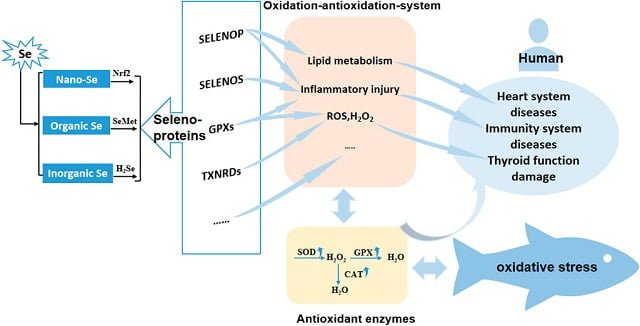
Optimizing the health and growth of tilapia remains a key challenge for producers. Recent research suggests a potential solution: green selenium nanoparticles (SeNPs).
The study, published in Scientific Reports by scientists from Mansoura University and Suez University, explored the impact of dietary SeNPs derived from the microalga Pediastrum boryanum on Nile tilapia. The findings are encouraging for tilapia producers seeking sustainable and effective ways to enhance the health and growth of their fish.
- 1 Nanoparticles: A Blessing for Aquaculture
- 2 Selenium Nanoparticles: A Powerful Tool
- 3 Improved Growth and Immune Response
- 4 Enhanced Antioxidant Activity
- 5 Safe and Sustainable
- 6 Looking Ahead: Functional Foods and Nutraceuticals
- 7 Implications for Tilapia Farming
- 8 Conclusion
- 9 Entradas relacionadas:
Nanoparticles: A Blessing for Aquaculture
Nanoparticles, tiny particles with unique properties, have gained significant attention in aquaculture research. They offer potential benefits for improving fish growth, enhancing feed efficiency, and stimulating immune responses. Environmentally synthesized nanoparticles, derived from natural sources like algae, are particularly attractive due to their eco-friendliness and biocompatibility.
Selenium Nanoparticles: A Powerful Tool
Among the various nanoparticles explored in aquaculture, selenium nanoparticles (SeNPs) have shown great promise.
SeNPs are tiny particles of selenium, an essential mineral for fish health. The “green” aspect refers to the eco-friendly method used to create these nanoparticles, utilizing microalgae such as Pediastrum boryanum.
Scientific studies have reported that eco-friendly synthesized SeNPs can offer the following benefits:
- Enhance fish growth and immunity: They have been shown to improve growth rates and strengthen the immune system, making fish more resistant to diseases.
- Reduce the harmful effects of heavy metals: SeNPs can help mitigate the negative impacts of heavy metals on fish health, promoting overall well-being.
- Exhibit antimicrobial activity: They have been found effective against a variety of fish pathogens, including those resistant to conventional antibiotics.
- Improve antioxidant capacity: SeNPs can help protect fish from oxidative stress, a major contributor to disease and reduced productivity.
Improved Growth and Immune Response
The study demonstrated that Nile tilapia fed diets supplemented with SeNPs exhibited significantly improved growth performance compared to the control group. Additionally, the fish showed enhanced innate immune parameters, indicating stronger defense against diseases. This improvement was observed in both concentrations of SeNPs tested (0.75 mg/kg and 1.5 mg/kg).
Enhanced Antioxidant Activity
The research also revealed positive effects on the antioxidant profile of tilapia supplemented with SeNPs. Specifically, the activity of the antioxidant enzyme catalase increased significantly, suggesting better protection against cellular damage caused by free radicals. Furthermore, reduced glutathione levels were also improved, further reinforcing the antioxidant defense system.
Safe and Sustainable
Importantly, the study found no adverse effects on liver function or inflammatory responses in tilapia fed SeNPs. This indicates a safe dietary approach to improving fish health. Moreover, the use of microalgae for SeNP synthesis aligns with the growing demand for sustainable and environmentally friendly aquaculture practices.
Stay Always Informed
Join our communities to instantly receive the most important news, reports, and analysis from the aquaculture industry.
Looking Ahead: Functional Foods and Nutraceuticals
The successful application of green SeNPs in Nile tilapia opens the door for further research and development. These findings suggest the possibility of incorporating SeNPs into functional feeds for tilapia, ultimately leading to healthier fish and potentially improved nutritional value for consumers. Additionally, SeNPs hold promise for the development of nutraceuticals that could benefit human health.
Implications for Tilapia Farming
These findings are promising for the future of tilapia aquaculture. Green SeNPs could potentially:
- Increase fish growth rates, leading to higher yields for farmers.
- Improve tilapia’s immune response, making them more resistant to diseases.
- Promote overall fish health through enhanced antioxidant activity.
Conclusion
The study demonstrates the potential of green-synthesized SeNPs as a valuable tool for sustainable tilapia aquaculture. By improving fish growth, enhancing health, and reducing the need for antibiotics, SeNPs can contribute to a more eco-friendly and productive aquaculture industry.
However, more research is needed to optimize SeNP dosage and explore long-term effects. These initial results pave the way for the potential incorporation of green SeNPs into functional fish feeds, offering a natural and sustainable approach to improving tilapia health and fostering a thriving aquaculture industry.
Contact
Eman Zahran
Department of Aquatic Animal Medicine, Faculty of Veterinary Medicine, Mansoura University
Mansoura, 35516, Egypt
Email: emanzahran@mans.edu.eg
Reference (open access)
H., A., Elbahnaswy, S., Eldessouki, E. A., Risha, E., & Zahran, E. (2024). Dietary biogenic selenium nanoparticles improve growth and immune-antioxidant indices without inducing inflammatory responses in Nile tilapia. Scientific Reports, 14(1), 1-10. https://doi.org/10.1038/s41598-024-72022-w
Editor at the digital magazine AquaHoy. He holds a degree in Aquaculture Biology from the National University of Santa (UNS) and a Master’s degree in Science and Innovation Management from the Polytechnic University of Valencia, with postgraduate diplomas in Business Innovation and Innovation Management. He possesses extensive experience in the aquaculture and fisheries sector, having led the Fisheries Innovation Unit of the National Program for Innovation in Fisheries and Aquaculture (PNIPA). He has served as a senior consultant in technology watch, an innovation project formulator and advisor, and a lecturer at UNS. He is a member of the Peruvian College of Biologists and was recognized by the World Aquaculture Society (WAS) in 2016 for his contribution to aquaculture.







